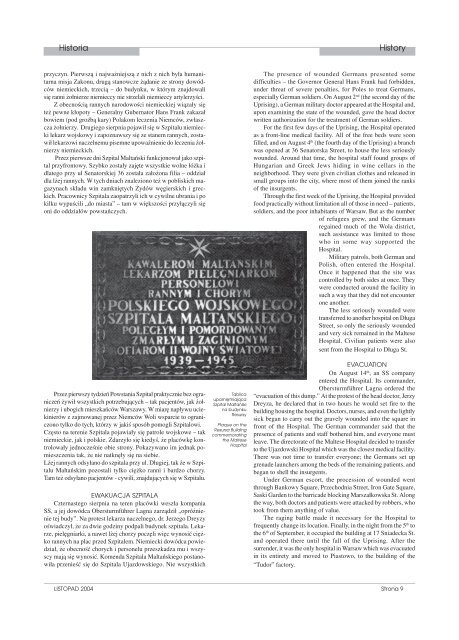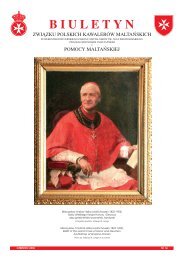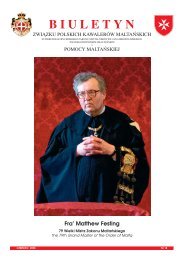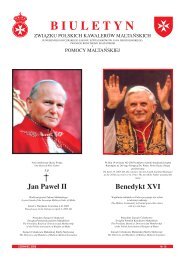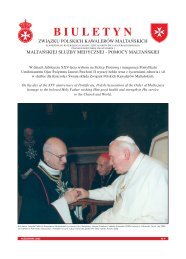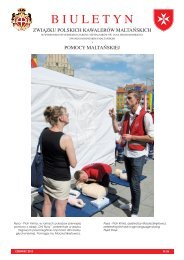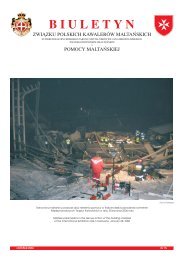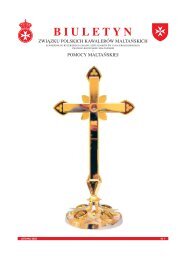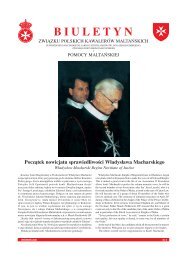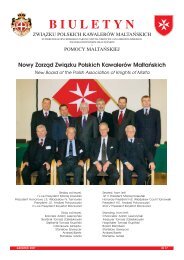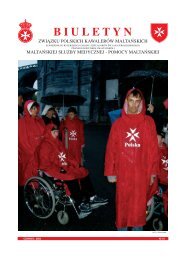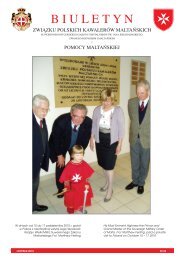Nr.11 - Zakon Maltański Polska
Nr.11 - Zakon Maltański Polska
Nr.11 - Zakon Maltański Polska
You also want an ePaper? Increase the reach of your titles
YUMPU automatically turns print PDFs into web optimized ePapers that Google loves.
HistoriaHistoryprzyczyn. Pierwszą i najważniejszą z nich z nich była humani−tarna misja <strong>Zakon</strong>u, drugą stanowcze żądanie ze strony dowód−ców niemieckich, trzecią – do budynku, w którym znajdowalisię ranni żołnierze niemieccy nie strzelali niemieccy artylerzyści.Z obecnością rannych narodowości niemieckiej wiązały sięteż pewne kłopoty – Generalny Gubernator Hans Frank zakazałbowiem (pod groźbą kary) Polakom leczenia Niemców, zwłasz−cza żołnierzy. Drugiego sierpnia pojawił się w Szpitalu niemiec−ki lekarz wojskowy i zapoznawszy się ze stanem rannych, zosta−wił lekarzowi naczelnemu pisemne upoważnienie do leczenia żoł−nierzy niemieckich.Przez pierwsze dni Szpital <strong>Maltański</strong> funkcjonował jako szpi−tal przyfrontowy. Szybko zostały zajęte wszystkie wolne łóżka idlatego przy ul Senatorskiej 36 została założona filia – oddziałdla lżej rannych. W tych dniach znaleziono też w pobliskich ma−gazynach składu win zamkniętych Żydów węgierskich i grec−kich. Pracownicy Szpitala zaopatrzyli ich w cywilne ubrania i pokilku wypuścili „do miasta” – tam w większości przyłączyli sięoni do oddziałów powstańczych.Przez pierwszy tydzień Powstania Szpital praktycznie bez ogra−niczeń żywił wszystkich potrzebujących – tak pacjentów, jak żoł−nierzy i ubogich mieszkańców Warszawy. W miarę napływu ucie−kinierów z zajmowanej przez Niemców Woli wsparcie to ograni−czono tylko do tych, którzy w jakiś sposób pomogli Szpitalowi.Często na terenie Szpitala pojawiały się patrole wojskowe – takniemieckie, jak i polskie. Zdarzyło się kiedyś, że placówkę kon−trolowały jednocześnie obie strony. Pokazywano im jednak po−mieszczenia tak, że nie natknęły się na siebie.Lżej rannych odsyłano do szpitala przy ul. Długiej, tak że w Szpi−talu <strong>Maltański</strong>m pozostali tylko ciężko ranni i bardzo chorzy.Tam też odsyłano pacjentów − cywili, znajdujących się w Szpitalu.EWAKUACJA SZPITALACzternastego sierpnia na teren placówki weszła kompaniaSS, a jej dowódca Obersturmführer Lagna zarządził „opróżnie−nie tej budy”. Na protest lekarza naczelnego, dr. Jerzego Dreyzyoświadczył, że za dwie godziny podpali budynek szpitala. Leka−rze, pielęgniarki, a nawet lżej chorzy poczęli więc wynosić cięż−ko rannych na plac przed Szpitalem. Niemiecki dowódca powie−dział, że obecność chorych i personelu przeszkadza mu i wszy−scy mają się wynosić. Komenda Szpitala <strong>Maltański</strong>ego postano−wiła przenieść się do Szpitala Ujazdowskiego. Nie wszystkichTablicaupamiętniającaSzpital <strong>Maltański</strong>na budynkuResursyPlaque on theResursa Buildingcommemoratingthe MalteseHospitalThe presence of wounded Germans presented somedifficulties – the Governor General Hans Frank had forbidden,under threat of severe penalties, for Poles to treat Germans,especially German soldiers. On August 2 nd (the second day of theUprising), a German military doctor appeared at the Hospital and,upon examining the state of the wounded, gave the head doctorwritten authorization for the treatment of German soldiers.For the first few days of the Uprising, the Hospital operatedas a front−line medical facility. All of the free beds were soonfilled, and on August 4 th (the fourth day of the Uprising) a branchwas opened at 36 Senatorska Street, to house the less seriouslywounded. Around that time, the hospital staff found groups ofHungarian and Greek Jews hiding in wine cellars in theneighborhood. They were given civilian clothes and released insmall groups into the city, where most of them joined the ranksof the insurgents.Through the first week of the Uprising, the Hospital providedfood practically without limitation all of those in need – patients,soldiers, and the poor inhabitants of Warsaw. But as the numberof refugees grew, and the Germansregained much of the Wola district,such assistance was limited to thosewho in some way supported theHospital.Military patrols, both German andPolish, often entered the Hospital.Once it happened that the site wascontrolled by both sides at once. Theywere conducted around the facility insuch a way that they did not encounterone another.The less seriously wounded weretransferred to another hospital on DługaStreet, so only the seriously woundedand very sick remained in the MalteseHospital. Civilian patients were alsosent from the Hospital to Długa St.EVACUATIONOn August 14 th , an SS companyentered the Hospital. Its commander,Obersturmführer Lagna ordered the“evacuation of this dump.” At the protest of the head doctor, JerzyDreyza, he declared that in two hours he would set fire to thebuilding housing the hospital. Doctors, nurses, and even the lightlysick began to carry out the gravely wounded into the square infront of the Hospital. The German commander said that thepresence of patients and staff bothered him, and everyone mustleave. The directorate of the Maltese Hospital decided to transferto the Ujazdowski Hospital which was the closest medical facility.There was not time to transfer everyone; the Germans set upgrenade launchers among the beds of the remaining patients, andbegan to shell the insurgents.Under German escort, the procession of wounded wentthrough Bankowy Square, Przechodnia Street, Iron Gate Square,Saski Garden to the barricade blocking Marszałkowska St. Alongthe way, both doctors and patients were attacked by robbers, whotook from them anything of value.The raging battle made it necessary for the Hospital tofrequently change its location. Finally, in the night from the 5 th tothe 6 th of September, it occupied the building at 17 Sniadecka St.and operated there until the fall of the Uprising. After thesurrender, it was the only hospital in Warsaw which was evacuatedin its entirety and moved to Piastowo, to the building of the“Tudor” factory.LISTOPAD 2004 Strona 9


